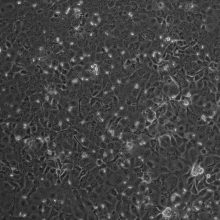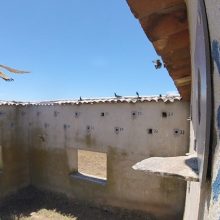We are delighted to announce Parasitology's joint-prize winners for the 2022 Early Career Researcher Award (for papers published in the journal in 2021). Only researchers who are no more than 7 years post award of their PhD were eligible to receive the award. Decisions on the winning papers were made by Russell Stothard and his team of supporting Editors. The winning papers are freely available.
Anna Sophia Feix has been awarded the Early Career Researcher Prize for submitting the paper entitled:
Anna Sophia Feix is an Austrian biologist with a special interest in parasitology, parasite-host interactions and different cell culture techniques. Currently, she is finishing her PhD, entitled “Characterization of Cystoisospora suis sexual stages” in the lab of Prof. Anja Joachim at the Institute of Parasitology, University of Veterinary Medicine Vienna, under a grant of the Graduate School “Pig and Poultry Medicine” of the University of Veterinary Medicine Vienna. Her main research objective is to explore connections between morphological observations and the composition and function of sexual stage specific proteins in the parasite development. During this process, she was able to characterize the sexual stages of C. suis and to establish a new host cell free in vitro culture system. This could also play a role as a model for other Apicomplexans. She plans to finish her PhD in 2022 and continue to work within this topic as a postdoc further funded by the Austrian Research Foundation (FWF).

João Gameiro and Jesús Veiga have been awarded the Early Career Researcher Prize for submitting the paper entitled:
Influence of colony traits on ectoparasite infestation in birds breeding in mixed-species colonies
João Gameiro is a researcher focused on ecology, behaviour, and conservation, mainly with birds. He developed his PhD in the BIODIV (Biodiversity, Genetics and Evolution) doctoral program, at the cE3c – Centre for Ecology, Evolution and Environmental Changes, University of Lisbon. He studied species interactions in mixed bird colonies established in artificial breeding structures in Southeast Portugal, addressing some consequences of group living such as protection from predators, competition for food, and transmission of ectoparasites. He was interested in how these new consequences could affect the conservation of Lesser Kestrels Falco naumanni and European Rollers Coracias garrulus, two threatened birds in Portugal, but ended up working with other species such as owls, pigeons or starlings. He defended is PhD earlier this year (2022), and he is currently participating in the BIOPOLIS project, Portugal, working with Montagu’s harrier Circus pygargus ecology and conservation.
Jesús Veiga is a postdoctoral researcher focused on the ecology of host-parasite relationships, vector-borne parasites and parasites transmission. He developed his PhD at the Experimental Station of Arid Zones (CSIC), studying the biotic and abiotic determinants of the relationships stablished between parasites and birds in arid zones. During his research he has investigated these relationships in specific ectoparasites species but also in ectoparasites communities, using multi-parasite approaches. He has also explored the role of some ectoparasites as vectors and hence, as determinants of endoparasites presence. After his PhD, he has been working as postdoctoral researcher at the Biological Station of Doñana (CSIC) to investigate the role of environmental and host characteristics on the prevalence of ticks in wild birds. Currently he has a “Margarita Salas” postdoctoral contract to work at Lund University and Granada University to explore the role of mosquito’s microbiota on parasite transmission.
